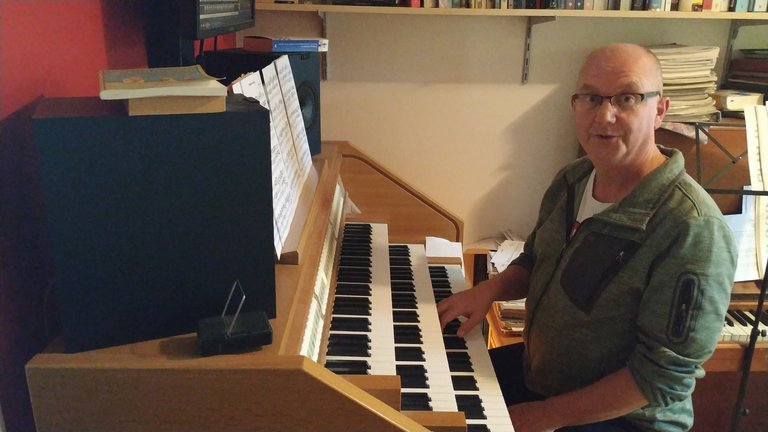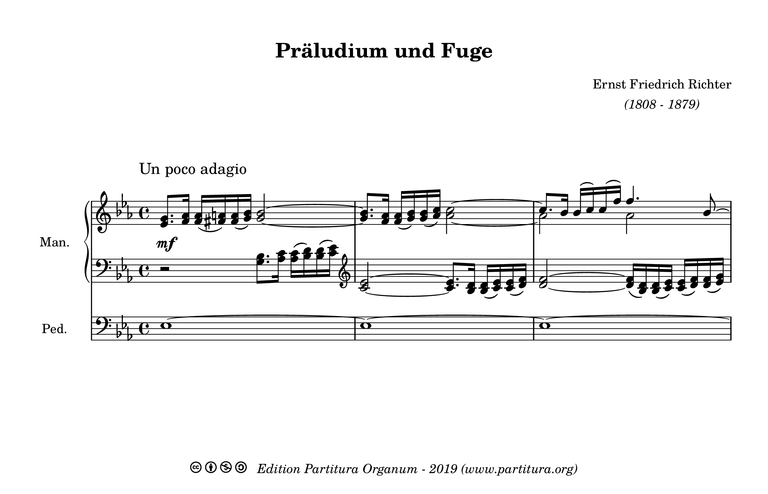Friedrich Ernst Richter, Präludium Es dur
This is my entry for the Secrets of Organ Playing Contest, week 42. I play one of the upcoming publications on my website: the prelude from "Präludium und Fuge, Es Dur" by Ernst Friedrich Richter.
I recently finished the first version of the score for this composition from the manuscript source. Playing through a first version of a score is my way of proofreading. Most typos are easily spotted that way. Yesterday I started 'proofreading' this prelude. As it actually went very well, I decided to make it my entry for this week's contest.
There are lots of chord passages in this, composition, four part writing, tuplet sixteenth alternating with regular ones, so I thought it would be quite a hard piece to practise. Imagine my surprise when it actually went very well on first play though. It's one of those pieces that fit my hands perfectly. I still don't know what makes that a piece is well suited to my hands. Or perhaps I should say it the other way around: what makes that my hands are well suited for certain compositions and much less for others.
I do know what makes compositions difficult: contrapuntal writing. The fugue that belongs to this fugue will take a lot longer than one morning to practise and record...
That it is still a new piece to me can be seen in bar 19: I forgot to change manuals in time. I am training myself to keep playing when things like that happen. You know the movie "Finding Nemo"? One of the main characters, Dory, sings a song in that movie, with the words "Just keep swimming, just keep swimming". That's what I keep in mind when I make mistakes like that: "Just keep playing, just keep playing".
In bar 24 my initial transcription has a flat for the right hand and a for the left hand. While playing I decided that the a flat was wrong, because the a sounded more beautiful to my ears. Checking with the manuscript however, shows it should be a flat. Now I know what my biggest problem with later performances of this composition is going to be: play a flat's in bar 24 and not a's.
Score: no score yet... :-)


You can support me using Steem Basic Income

Sounds fantastic. That reverb really sounds like you are in a cathedral! Beautifully played.
I used a sample set of a real organ in a real church. That's probably why it sounds so realistic.
ah! Sounds great!
This post has been curated due to its unique musical content. We sent you some ATOM via Steam-Engine.com
Use your ATOM to get upvotes from @MusicVoter2 via our Discord.
@tipu curate
Upvoted 👌 (Mana: 1/3)
I fully expected this piece to be baroque but I was pleasantly surprised! Another one for me to learn. Beautifully played.
I try to avoid becoming a one-trick pony. Richter was a very old fahioned composer even in his own days. That probably why I feel comfartable playing his music. So, a one-trick pony after all...?
Resteemed, your post will appear in the next curation with a SBD share for you!
Your post has been supported and upvoted from the Classical Music community on Steemit as it appears to be of interest to our community. We also support jazz and folk music posts!
If you enjoy our support of the #classical-music community, please consider a small upvote to help grow the support account!
You can find details about us below.
The classical music community at #classical-music and Discord. Follow our community accounts @classical-music and @classical-radio or follow our curation trail (classical-radio) at SteemAuto!
Delegation links: 10SP, 25SP, 50SP, 75SP, 100SP, 150SP, 200SP, 250SP, 500SP, 1000SP
It's amazing that even in 19th century some people were writing music which is not so different from the Baroque period. !organduo 500
@partitura you have received

500 ORGANDUOfrom organduo!Trade the tokens on Steem Engine or send them to @organduo.voter with post in memo for an upvote!
This tip bot is powered by witness untersatz!